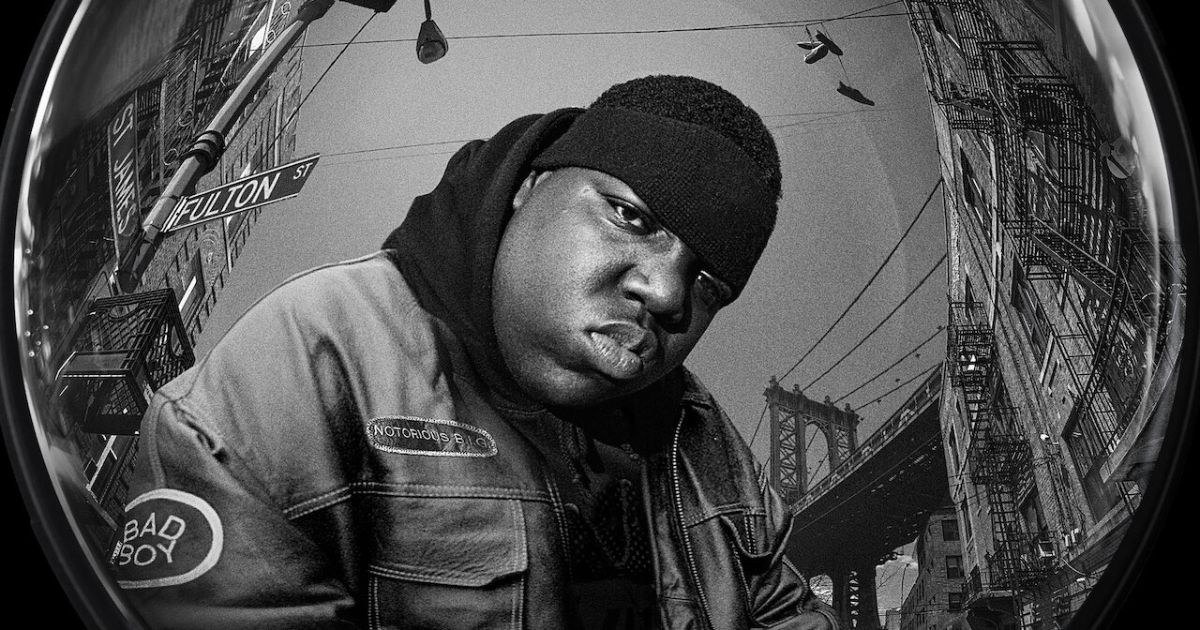Step into the world of hip-hop and witness the meteoric rise of one of its most iconic figures – Biggie Smalls. From the gritty streets of Brooklyn to the pinnacle of rap royalty, this larger-than-life artist left an indelible mark on the music industry. Known for his raw and unapologetic lyricism, Biggie Smalls, also known as The Notorious B.I.G., broke barriers and shattered stereotypes, captivating audiences with his undeniable talent and magnetic presence. This captivating journey takes us back to the humble beginnings of a young Christopher Wallace, who navigated the treacherous streets of Brooklyn, using rap as his escape and voice. Through sheer determination and a relentless pursuit of his dreams, Biggie rose to prominence, capturing the hearts of fans worldwide and forever changing the landscape of hip-hop. Join us as we delve into the extraordinary life and enduring legacy of Biggie Smalls, a true legend who continues to inspire generations of artists to this day.

Biggie Smalls Clothing & Merchandise
Give your wardrobe a taste of ’90s hip-hop with the most extensive collection of Notorious B.I.G.’s clothing and merchandise online! From vintage t-shirts to stylish hoodies and comfy sweatshirts, you will have no shortage when it comes to showing love for Biggie Smalls – East Coast’s greatest rapper! And if that wasn’t enough, check out exclusive bomber jackets featuring The King himself. Get these unique items now before they’re gone forever… show off your swag with some iconic rap apparel today!
Early life and upbringing
Born on May 21, 1972, in Brooklyn, New York, Christopher George Latore Wallace grew up in the borough’s rough and impoverished neighborhood of Bedford-Stuyvesant. Raised by a single mother, Voletta Wallace, Biggie faced the harsh realities of life from an early age. Despite the challenges, music became a refuge for him. Influenced by the vibrant hip-hop culture that thrived in Brooklyn during the 1980s, Biggie began honing his craft, writing rhymes and freestyling with local artists.
As a teenager, Biggie’s talent became evident to those around him. His distinctive flow and lyrical prowess set him apart from his peers. However, the allure of the streets proved difficult to resist. Biggie, like many young men in his neighborhood, was enticed by the allure of fast money and the dangerous lifestyle associated with it. Yet, even in the midst of this struggle, his love for music remained unwavering, and he continued to pursue his artistic ambitions.
The rise of Biggie Smalls in the rap scene
Biggie’s breakthrough into the rap scene came in the early 1990s when he caught the attention of Sean “Puff Daddy” Combs, then an A&R executive at Uptown Records. Recognizing Biggie’s immense talent, Combs signed him to his new label, Bad Boy Records. With Combs as his mentor and producer, Biggie began recording tracks that showcased his lyrical genius and storytelling ability.
In 1994, Biggie released his debut single, “Juicy,” which sampled the iconic track “Juicy Fruit” by Mtume. The song became an instant hit, catapulting Biggie into the mainstream spotlight. With its autobiographical lyrics and infectious melody, “Juicy” captured the struggles and triumphs of his journey from rags to riches. The success of the single set the stage for his debut album, “Ready to Die.”
Notorious B.I.G. – debut album and breakthrough success
“Ready to Die,” released in September 1994, was an instant classic. The album showcased Biggie’s storytelling abilities, painting vivid pictures of street life, love, and survival in Brooklyn. Tracks like “Gimme the Loot,” “Big Poppa,” and “Warning” solidified Biggie’s reputation as one of the greatest lyricists of his time. The album’s raw honesty and gritty delivery resonated with audiences from all walks of life, propelling it to multi-platinum status.
Biggie’s success continued to soar with the release of his second album, “Life After Death,” in 1997. The album featured chart-topping hits such as “Hypnotize” and “Mo Money Mo Problems.” Tragically, “Life After Death” would be released just weeks after his untimely death, cementing his status as a rap legend.
Influence and impact of Biggie Smalls on the rap industry
Biggie’s impact on the rap industry cannot be overstated. His unique blend of street life narratives, vivid storytelling, and impeccable flow set a new standard for aspiring artists. Biggie’s music resonated not only with those who could relate to the struggles of inner-city life but also with a wider audience who appreciated his unparalleled skill as an MC.
Biggie’s influence extended beyond his music. He played a crucial role in popularizing East Coast rap and bringing it to the forefront of the genre. His distinct style, characterized by his deep voice, effortless delivery, and clever wordplay, became synonymous with the golden era of hip-hop. Artists such as Jay-Z, Nas, and Eminem have all cited Biggie as a major influence on their own careers.
Controversies and legal troubles
While Biggie’s music brought him fame and fortune, it also came with its fair share of controversies and legal troubles. As his notoriety grew, so did the attention from law enforcement. Biggie’s lyrics often depicted the harsh realities of street life, and some interpreted them as confessions to criminal activity. This led to ongoing investigations and legal battles that overshadowed his career.
In 1995, Biggie and his former friend turned rival, Tupac Shakur, became embroiled in a highly publicized feud that would ultimately lead to both men’s tragic deaths. The East Coast-West Coast rivalry fueled by media sensationalism and personal animosity between the two artists escalated to dangerous levels, resulting in violence and loss of life.
Life and tragic death of Biggie Smalls
On March 9, 1997, tragedy struck the music world when Biggie Smalls was gunned down in Los Angeles at the age of 24. His murder remains unsolved, leaving behind a void in the rap community and a legacy cut short. Biggie’s death marked the end of an era and sparked a conversation about the dangers of violence and feuds within the industry.
Legacy and posthumous success
Despite his untimely demise, Biggie Smalls’ legacy lives on. His influence can still be felt in the music of today, as artists continue to pay homage to his style and lyrical prowess. In the years following his death, several posthumous albums were released, including “Life After Death” and “Born Again,” which showcased unreleased tracks and collaborations. These albums further solidified Biggie’s status as a rap icon and continued to captivate audiences worldwide.
Biggie Smalls’ discography and notable songs
Throughout his career, Biggie Smalls released two studio albums, “Ready to Die” and “Life After Death,” both of which are considered seminal works in hip-hop. His discography also includes posthumous albums such as “Born Again” and “Duets: The Final Chapter.” Some of his most notable songs include “Juicy,” “Big Poppa,” “Hypnotize,” and “Mo Money Mo Problems.”
-
 The Notorious B.I.G. Logo Design Black & White Snapback
The Notorious B.I.G. Logo Design Black & White Snapback -
 Bad Boy Entertainment Logo Pattern Black Varsity Jacket
Bad Boy Entertainment Logo Pattern Black Varsity Jacket -
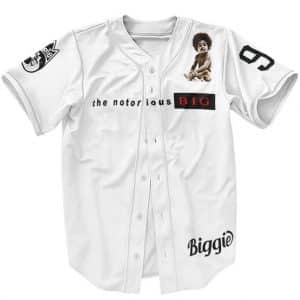 The Notorious BIG Ready To Die Album Cover Art White Baseball Jersey
The Notorious BIG Ready To Die Album Cover Art White Baseball Jersey -
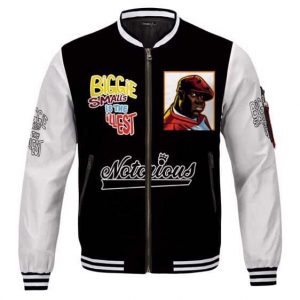 Notorious Biggie Smalls Is The Illest Bad Boy Varsity Jacket
Notorious Biggie Smalls Is The Illest Bad Boy Varsity Jacket -
 Biggie Bad Boy Entertainment Logo Black Bomber Jacket
Biggie Bad Boy Entertainment Logo Black Bomber Jacket -
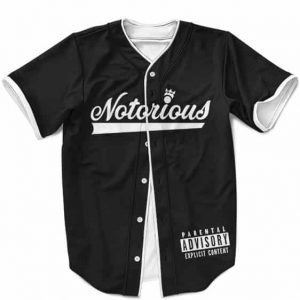 Big Poppa Notorious BIG 1972 Birthyear Clean Black Dope Baseball Uniform
Big Poppa Notorious BIG 1972 Birthyear Clean Black Dope Baseball Uniform -
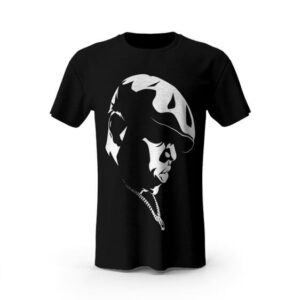 Face Silhouette Biggie Smalls Crown Logo T-Shirt
Face Silhouette Biggie Smalls Crown Logo T-Shirt -
 Iconic 90s Rappers Supreme Artwork Epic Pullover Hoodie
Iconic 90s Rappers Supreme Artwork Epic Pullover Hoodie -
 Biggie Smalls Louis Vuitton Pattern Dope Men’s Boxer Shorts
Biggie Smalls Louis Vuitton Pattern Dope Men’s Boxer Shorts
The enduring popularity of Biggie Smalls
Biggie Smalls’ impact on the rap industry and popular culture is still evident today. His music continues to be celebrated and revered, with new generations discovering his timeless tracks. The enduring popularity of Biggie Smalls serves as a testament to his unparalleled talent and the lasting imprint he left on the world of music.
Conclusion
Biggie Smalls, a true legend in every sense of the word, rose from the streets of Brooklyn to become one of the greatest rappers of all time. His raw and unapologetic lyricism, coupled with his magnetic presence, captivated audiences and shattered barriers within the industry. Despite facing numerous challenges and controversies, Biggie’s talent and determination propelled him to the pinnacle of rap royalty. His enduring legacy serves as an inspiration to aspiring artists worldwide, reminding us all that with passion and perseverance, dreams can become reality. The rise of Biggie Smalls will forever be etched in the annals of hip-hop history, reminding us of the power of music to transcend boundaries and touch the souls of millions.

